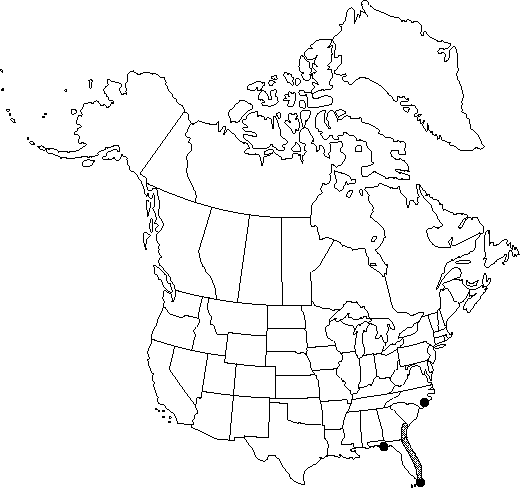Ceratophyllum muricatum subsp. australe
Syst. Bot. 13: 85. 1988.
Stems to 1 m; apical leaf whorls not densely crowded. Leaves light green to yellow-green, fine-textured. Leaf blade simple or forked into 2-10 ultimate segments (forking of largest leaves 3d or 4th order), segments sometimes conspicuously inflated, mature leaf whorls 2.5-6 cm diam., marginal denticles weak and inconspicuous, not raised on broad base of green tissue, sometimes nearly absent; 1st leaves of plumule simple. Achene green or dark brown, body (excluding spines) 3-4.5 × 2-3 × 1-2 mm, basal spines 2 (rarely absent), straight or curved, 0.3-4.5 mm, marginal spines (0-)2-20, 0.1-4 mm, terminal spine straight or curved, 1.5-7.5 mm, margins slightly winged.
Phenology: Flowering spring.
Habitat: Fresh water of ponds and lakes
Elevation: 0-50 m
Distribution

Fla., Ga., N.C., Mexico, West Indies, Central America, South America.
Discussion
Principally of tropical distribution, Ceratophyllum muricatum is known in North America north of Mexico only from ephemeral habitats in coastal southeastern United States. The wide range of variation of spines on the fruits in C. muricatum has led to the describing of several variants (typically when spine lengths have been reduced) as different species. As in C. demersum, spineless phenotypes from North America have been called C. submersum Linnaeus, which does not occur in the New World. The affinity of C. muricatum for shallow, ephemeral habitats results in its sporadic and nonpersistent occurrence in present North American localities. Fossil records of C. muricatum from the lower and middle Eocene document its occurrence in more inland sites, presumably when the climate of the interior stations was more similar to tropical conditions. Of the three North American species of Ceratophyllum, this species is most likely to be collected (in season) with fruit present.
Selected References
None.